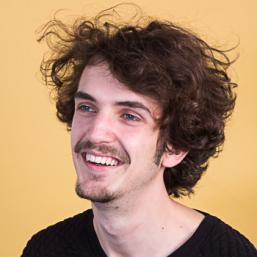
Climate Change
‘When I ask my class, “Who here cares about climate change?” virtually all hands go up,’ Manuel Allgaier, a 21-year old student from Germany told Folia during Peoples Climate March, a series of worldwide demonstrations in anticipation of the climate conference in Paris last year. The Environmental Studies undergraduate spent several weeks going from one lecture hall to the next, trying to engage students in the Peoples Climate March. ‘But when I ask who of them will be going to the demonstration, at most five of those hands are still showing. There is often a large gap between what we believe in and what we actually do.’ Allgaier studied at the UvA for a year before switching to AUC in September 2015. ‘At AUC there are many active committees whose focus is primarily on content. Compare this to the UvA where many of the associations were focused on “gezelligheid”. There, it was more about social activities and parties, not so much about discussion.’ The AUC community, which is small and tightly knit, seems to be more engaged with issues such as gender role and racism. ‘The UvA is much more homogenous than AUC. I think AUC students are more aware of these issues because everyone is from different cultural backgrounds.’
Refugee Crisis
‘I think social and political engagement has become an inherent part of the AUC community,’ says Michael Vermeer (22), ex-AUC student and current graduate intern at AUC and architect of AUC’s Jeugdland, Jeugdlab and Voices of AUC initiatives. ‘Just look at Right2Education. They managed to involve over a third of the student body in their project.’ Right2Education aims to integrate refugees into AUC’s academic community through social activities, Dutch language classes and a buddy program. Some AUC students have also adopted a more activist approach by joining in protest against KLM, the royal Dutch airline that was organising charter flights for expelled refugees. That KLM is one of AUC’s sponsors seemed to be all the more reason to voice concern.
‘AUC is a very young university with a largely blank slate. As students, we are now filling in the blank pages. This means that there is a certain expectation from both management and the student body for people to be socially involved, in any shape, way or form. On top of that, the fact that the AUC com-munity is so small means that all projects are highly visible,’ says Vermeer.
UvA
‘There are, of course, also UvA students that play active roles in discussing and engaging with large social topics,’ Manuel Allgaier admits, ‘but they do this through organisations outside of the university. AUC has institutionalised a hands-on, activist approach. It is very easy to get funding through AUC — all you need is an idea. Just as an example, I am, amongst other things, involved with AUC’s sustainability association where I’m setting up a garden to grow our own food. I just felt like exploring that side of the issue, and there was no problem getting funding for it.’
‘It is very important for these initiatives to have a platform on which they can evolve, and the small scale of the AUC community provides that platform,’ says Vermeer. ‘Look at the Maagdenhuis occupation — it worked because the concerns raised echoed throughout a large part of the student population; but in general, it is much harder at the UvA to find topics that are taken up so widely within the student body. This is very different at AUC.’ Another reason for AUC’s high social engagement identified by Vermeer is its rather strict selection procedure. ‘AUC applicants are selected partially on their grades, but also on the extracurricular activities they’re involved with. A lot of students already did volunteer work or were involved with social initiatives before they came here — any project they then start here is then often a continuation of what they were already doing.
‘We have enough examples of people who know exactly what the big issues are, but who don’t do anything to help’ says Vermeer. ‘There are enough people who recognise the humanitarian disaster that is the refugee crisis, say, or who know that we are the last generation that can do anything about climate change. And yet they simply don’t get involved in these issues. We need more than awareness, more than just the ability to recognise and raise concerns about the world’s problems. We need people that are actually willing and able to do something about these issues — even if it’s only on a small scale, and even if they are only students.’

